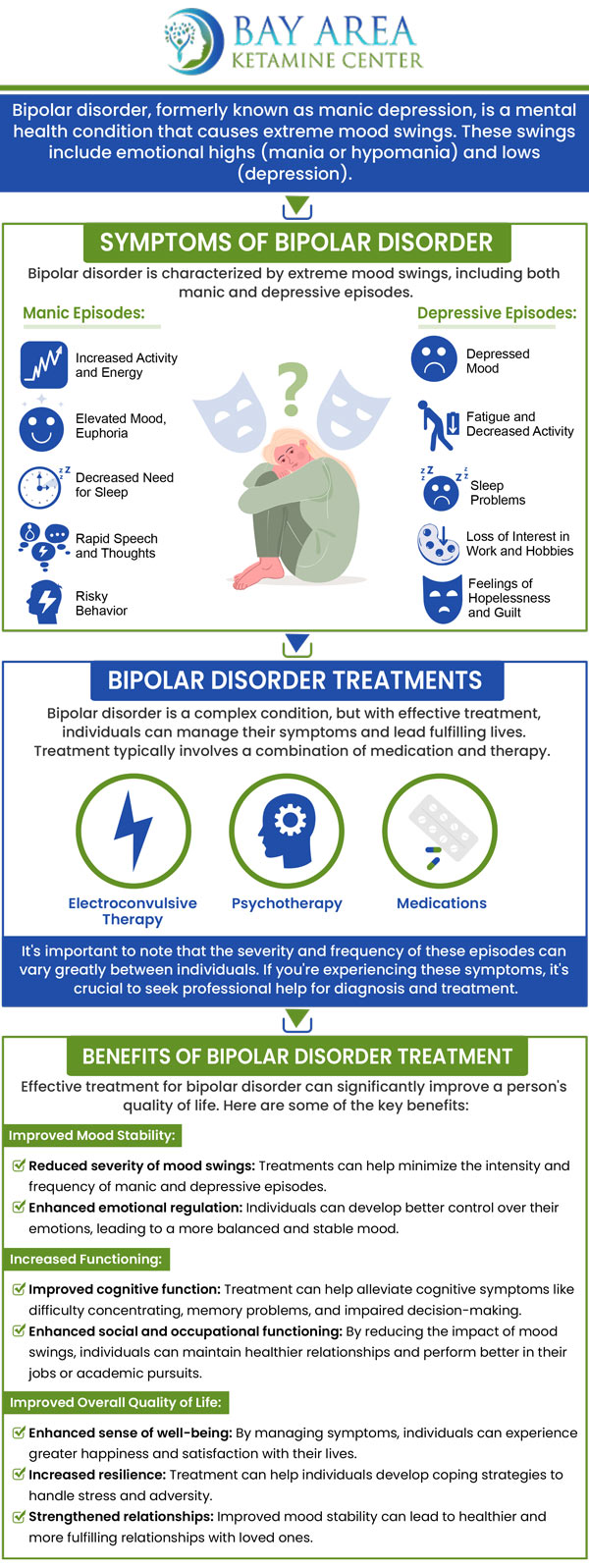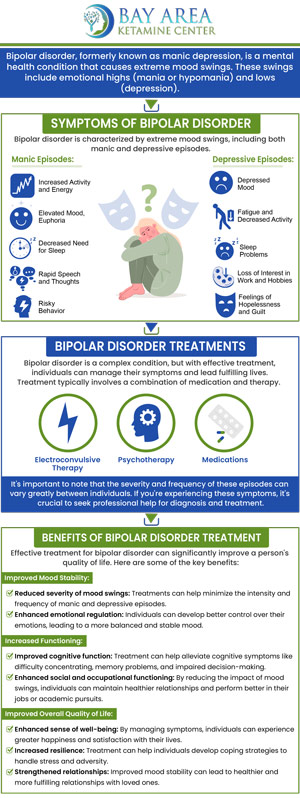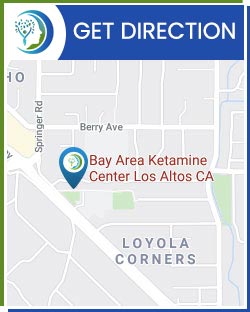Benefits of Ketamine for Bipolar Depression Treatment Q&A
At Bay Area Ketamine Center, we offer ketamine therapy, a promising treatment option for patients with bipolar depression. Ketamine works quickly to alleviate symptoms, often providing relief when traditional treatments have been ineffective. This innovative approach helps improve mood, reduce depressive episodes, and enhance overall mental well-being, offering hope for those struggling with treatment-resistant bipolar depression. Please contact us today or book an appointment online now! Our clinic is conveniently located at 746 Altos Oaks Drive Suite B, Los Altos, CA 94024.




Table of Contents:
How does ketamine work for bipolar depression?
What are the benefits of ketamine for bipolar depression?
Is ketamine effective for bipolar depression?
How is ketamine administered for bipolar depression?
This condition is marked by intense highs (mania) and crippling lows (depression), often linked to an imbalance of mood-regulating brain chemicals like serotonin, dopamine, and norepinephrine.
While conventional antidepressants aim to rebalance these chemicals, ketamine’s approach is less understood, making it a novel treatment option. As a dissociative anesthetic, ketamine primarily interacts with the NMDA receptors in the brain, blocking the influx of calcium ions and potentially disrupting the overactivity of the glutamate system, which is often implicated in bipolar depression.
Ketamine’s effects extend beyond the glutamate system. It also stimulates new connections between neurons, a process known as neuroplasticity, which is thought to contribute to the drug’s swift antidepressant effects. Furthermore, ketamine enhances the activity of the dopaminergic and serotonergic systems and modulates GABA signaling, potentially reducing anxiety and depressive symptoms.
Notably, the speed of ketamine’s effects distinguishes it from traditional antidepressants. Relief from depressive symptoms can be observed within hours of administration, which can be lifesaving for patients with severe, resistant depression. Ketamine is typically administered as a low-dose intravenous infusion, with many patients reporting mood improvements lasting up to a week or longer.
However, at Bay Area Ketamine Center, we emphasize that ketamine is not a first-line treatment for bipolar depression due to potential side effects like nausea, increased blood pressure, hallucinations, and other perceptual changes. It’s generally used only when other treatments have failed.
Research has shown that ketamine can serve as a potential treatment for bipolar depression.
Advantages of Ketamine Therapy:
• Immediate Relief: Unlike traditional antidepressants that take weeks to months to show effects, ketamine therapy offers quick relief from depressive symptoms, often within hours to days of the first administration.
• Extended Remission: Ketamine treatment may result in extended remission from depressive episodes.
• Effective for Treatment-Resistant Depression: Our center has had success using ketamine to treat patients who have not responded to traditional treatments.
• Anti-suicidal Properties: Ketamine has been found to reduce suicidal thoughts and behaviors, providing a lifeline for individuals with severe depression.
• Enhanced Neuroplasticity: Ketamine therapy may enhance the brain’s ability to form and reorganize synaptic connections, potentially leading to long-term improvements in brain health and functioning.
While ketamine therapy offers numerous benefits, it’s important to note that it requires professional supervision due to its potential risks.
• Need for Repeated Injections: Optimal results from ketamine therapy typically require multiple sessions over several weeks.
• Possible Side Effects: Transient side effects like dissociation, hallucinations, and confusion may occur, which we carefully monitor and manage at our center.
• Potential for Abuse: We strictly supervise the use of ketamine due to its potential for abuse and dependence.
• Long-Term Safety: The long-term safety profile of ketamine is still being studied. We remain updated with ongoing research to ensure the best care for our patients.
We administer ketamine under strict professional supervision at our center, focusing on the safety and well-being of our patients.
At the Bay Area Ketamine Center, we understand that bipolar depression, with its characteristic severe mood swings from mania to depression, can be difficult to manage. Traditional treatments like antidepressants and mood stabilizers often fall short of providing sufficient relief. This is why we are exploring the use of ketamine, originally a dissociative anesthetic medication used for initiating and maintaining anesthesia, as a potential alternative treatment.
By inhibiting glutamate reuptake, ketamine increases the levels of this neurotransmitter in the synaptic cleft. As glutamate plays a pivotal role in mood regulation, its dysregulation is often implicated in the onset of depression.
Several clinical trials suggest that ketamine could provide rapid relief from depressive symptoms. In some trials, people with bipolar depression experienced significant symptom reduction within hours to days after a single dose of ketamine. Such effects were observed even in patients who had not responded adequately to other standard treatments. Both intravenous (IV) and intranasal administration of ketamine have been shown to produce rapid and robust antidepressant effects.
Ketamine’s Potential Advantages
• Rapid Onset: The antidepressant effects of ketamine can manifest within a few hours, offering much quicker relief than traditional treatments.
• Durable Effects: The effects of ketamine can last from a few days to a week, providing temporary relief from depressive symptoms.
• Broad Efficacy: Ketamine seems effective in treating bipolar depression resistant to other medications.
Ketamine’s Limitations and Cautions
• Temporary Effects: The effects of ketamine are temporary, making it potentially beneficial in severe cases until other treatments take effect, but not a long-term solution.
• Dissociative Effects: Ketamine can induce dissociative effects, such as hallucinations and feelings of detachment. These effects usually wane within a few hours.
• Potential for Abuse: As ketamine has a potential for abuse and dependence, it is administered under the rigid supervision of our healthcare professionals at the Bay Area Ketamine Center.
• Limited Long-Term Data: Despite promising results, more long-term data is needed to evaluate the safety and efficacy of ketamine use over extended periods.
Depending on the severity of the individual’s symptoms and the controlled clinical setting at our center, Ketamine can be administered in several ways:
Intravenous (IV) Infusion:
• At Bay Area Ketamine Center, we often use this method where Ketamine is dissolved in saline and slowly infused into a vein over approximately 40 to 45 minutes.
• This method allows us to have precise control over the dosage and make rapid adjustments if necessary, with patients closely monitored throughout to ensure their safety and comfort.
Intramuscular Injection (IM):
• Ketamine can also be directly injected into a muscle, providing slow absorption into the bloodstream.
Oral Administration:
• Though less common due to unpredictable absorption in the digestive tract, this method is also available at our center.
The dosage of Ketamine administered at our center can vary greatly depending on individual factors such as the patient’s weight, overall health, and the severity of their symptoms. However, doses for intravenous administration typically range from 0.5 to 1.0 milligrams per kilogram of body weight.
• Treatment Frequency: The treatment of bipolar depression with Ketamine typically involves a series of infusions or sprays over a period of weeks or months, tailored according to individual response and tolerability.
• Monitoring and Follow-up: We closely monitor patients during Ketamine administration for potential side effects, with regular follow-up to ensure the safety and effectiveness of the treatment.
• Important Considerations: While the effects of Ketamine can be felt quickly, usually within a few hours to a few days, it is not a permanent solution. Most patients at our center will need repeated doses or ongoing treatment to maintain the benefits.
Though off-label, as it is not FDA-approved for this specific indication, the use of Ketamine for bipolar depression has demonstrated promising results. Our team may also recommend combination therapy with other medications to optimize treatment outcomes. We always encourage our patients to discuss potential side effects and risks with our qualified healthcare professionals before beginning treatment. Visit us online for directions to our leading clinic and to learn more about our services. We also encourage everyone to visit us online to learn more about our special offers that will help you spend less and feel better! We serve patients from Los Altos CA, Sunnyvale CA, Palo Alto CA, Stanford CA, Atherton CA, Cupertino CA, Santa Clara CA, Mountain View CA, Loyola CA, and surrounding areas.

Check Out Our 5 Star Reviews







